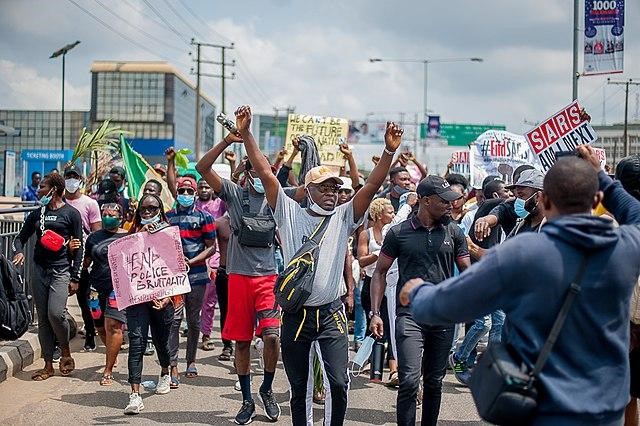[By Adeolu Adekola]
“True patriotism hates injustice in its own land more than anywhere else.” – Clarence Darrow
According to the Cambridge English Dictionary, a movement simply is a group of people with a particular set of aims or ideas. On October 3rd 2020, a video surfaced online allegedly claiming that officers of the Special Anti-Robbery Squad (SARS) shot one Ochuko in front of Westland Hotel, Ughelli, Delta State and drove off in his car. The outrage dovetailed into a warehouse that the #EndSARS movement needed. After falling on deaf ears for several years, the silos of agitation and demand for sincere actions to be taken by state actors to eliminate rogue police officers meant young persons in Nigeria needed to move from just having an idea or an ideology to then ‘sọ̀rọ̀ sókè’.

It was unimaginable that a unit of the Nigerian police that had been disbanded multiple times still brazenly carried out its nefarious activities, hence, the consequent ban of SARS with other tactical squads from carrying out their routine patrols by the Inspector General of Police on October 4th was obviously not enough. And then on October 8th, the protests commenced and the internet was awash with numerous accounts of anguish, pain and trauma of relations and friends of persons maimed by the brutality of men of the Nigeria Police Force (NPF).
When a system does not place value on the life of its people, and when the consistent abuse of citizens, especially young Nigerians by a specific unit of the police goes unpunished, it was only a matter of time before the idea behind #EndSARS became a mandate for good governance. The frustrations about police brutality became an avenue to air other concerns. The #EndSARS protest by October 11th, mandated 5 things in the short, mid and long-term to measure the commitment of the Nigerian government in reforming the police.
29 states (and the FCT) constituted Judicial Panels of Inquiry to interrogate the issues as part of the #5for5 demands. According to the monitoring efforts of Yiaga Africa and Enough is Enough (EiENigeria), 25 states have concluded sitting, FCT resumed sitting this week and 4 states have suspended sitting. However, only the reports of the Ekiti, Bayelsa and Ondo panels have been submitted, presented to their respective state governments and are publicly available for scrutiny. The reports from the judicial panels in Abia, Cross River and Nasarawa states, though presented to the state governments, are not available to the public. With over 2,700 petitions submitted across the judicial panels and some compensations recommended to victims of police brutality, there are still concerns that the state actors are not doing enough. Were the judicial panels set up just to tick the box? What is keeping the states that suspended sitting from resuming? Why are the reports of the other states that have concluded sitting not publicly accessible? What punishment has been meted out to the officers indicted?
The tactics adopted by the state to suppress the voices of the movement showed insincerity to the mandate of a reformed police. Several protesters were teargassed, arrested, and killed during the protests. By October 13, Amnesty Nigeria had tracked the killing of at least 10 Nigerians during the protests. Jimoh Isiaka, for example, was killed when police opened fire to disperse protesters in Ogbomosho, Oyo State on October 10 while Mr. Iloamauzor was killed on October 12 in Surulere, Lagos State when the police attacked #EndSARS protesters. Sadly, a year after hitting the streets, some protesters are still being incarcerated for protesting. The height of it all is the denial of the Nigerian government to address the occurrence of October 20 2020, when officers of the Nigerian Army at 6:45 pm shot at peaceful protesters at the Lekki toll gate. The media has documented that the #LekkiMassacre happened. Who gave the orders? Why shoot at unarmed protesters? Why hasn’t anyone been held responsible for what happened? These endless questions without answers and several actions to stifle citizens’ right to freedom of expression afterwards can only mean that the movement and mandate have become a marathon. According to the renowned Nigerian novelist, Professor Chinua Achebe, “Nigeria is what it is because its leaders are not what they should be.”
The independence anniversary month of Nigeria is forever going to reference the #EndSARS movement. No amount of cosmetic fixes, gaslighting and truth-twisting by government officials will make this go away. Independence depicts freedom, but can this be truly seen by the actions of the government? The #LekkiMassacre happened with protesters singing the national anthem and waving the Nigerian flag. What more can be an irony than this? The state actors and government of the day may not like the idea of the movement and the demands of the mandate, but what is clear is that their suppression of the voice of young Nigerians reeks of undemocratic tendencies. To achieve one nation bound in freedom, peace and unity as contained in the national anthem, some key elements such as justice, freedom and equity must be in place.
The popular quote that “eternal vigilance is the price of liberty” cannot be more accurate. So in the true spirit of patriotism, the marathon will continue until victory is attained. While the events of October 20, 2020 and the aftermath made some young citizens lose hope in the system, others are keeping the faith by actively taking part in governance by registering to vote, activating their #OfficeoftheCitizen and asking questions to hold power accountable. Young citizens are no longer at ease and there is no backing down from the movement, mandate and marathon of good governance.

- Adeolu Adekola is an active citizen writing from Lagos and working around accountability in governance, civic engagement and investigative journalism.
